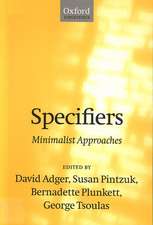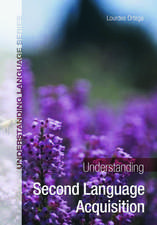Methods for Studying Language Production
Editat de Lise Menn, Nan Bernstein Ratneren Limba Engleză Paperback – oct 1999
Preț: 590.36 lei
Preț vechi: 694.54 lei
-15% Nou
Puncte Express: 886
Preț estimativ în valută:
112.98€ • 122.68$ • 94.90£
112.98€ • 122.68$ • 94.90£
Carte tipărită la comandă
Livrare economică 23 aprilie-07 mai
Preluare comenzi: 021 569.72.76
Specificații
ISBN-13: 9780805830347
ISBN-10: 0805830340
Pagini: 448
Dimensiuni: 152 x 229 x 23 mm
Greutate: 0.59 kg
Ediția:1
Editura: Taylor & Francis
Colecția Psychology Press
Locul publicării:Oxford, United Kingdom
ISBN-10: 0805830340
Pagini: 448
Dimensiuni: 152 x 229 x 23 mm
Greutate: 0.59 kg
Ediția:1
Editura: Taylor & Francis
Colecția Psychology Press
Locul publicării:Oxford, United Kingdom
Public țintă
ProfessionalCuprins
Contents: N.B. Ratner, L. Menn, In the Beginning Was the Wug: Forty Years of Language-Elicitation Studies. Part I:Eliciting Knowledge of Language. E.F. Masur, Infants' Verbal Imitation and Their Language Development: Controversies, Techniques, and Consequences. L. Gerken, Examining Young Children's Morphosyntactic Development Through Elicited Production. E.V. Clark, Coining New Words: Old and New Word Forms for New Meanings. R.A. Berman, Children's Innovative Verbs Versus Nouns: Structured Elicitations and Spontaneous Coinages. J. Gropen, Methods for Studying the Production of Argument Structure in Children and Adults. K.E. Nelson, Methods for Stimulating and Measuring Lexical and Syntactic Advances: Why Fiffins and Lobsters Can Tag Along With Other Recast Friends. C. Doughty, M.H. Long, Eliciting Second Language Speech Data. Part II:Gathering Production Data in Naturalistic Settings. C.E. Johnson, What You See Is What You Get: The Importance of Transcription for Interpreting Children's Morphosyntactic Development. B.A. Pan, R.Y. Perlmann, C.E. Snow, Food for Thought: Dinner Table as a Context for Observing Parent-Child Discourse. E. Andersen, Exploring Register Knowledge: The Value of "Controlled Improvisation." R. Ely, A. Wolf, A. McCabe, G. Melzi, The Story Behind the Story: Gathering Narrative Data From Children. S. Ervin-Tripp, Studying Conversation: How to Get Natural Peer Interaction. Part III:Developmental Disorders. N.B. Ratner, Elicited Imitation and Other Methods for the Analysis of Trade-Offs Between Speech and Language Skills in Children. H. Tager-Flusberg, The Challenge of Studying Language Development in Children With Autism. L.B. Leonard, Understanding Grammatical Deficits in Children With Specific Language Impairment: The Evaluation of Productivity. M.L. Donahue, Influences of School-Age Children's Beliefs and Goals on Their Elicited Pragmatic Performance: Lessons Learned From Kissing the Blarney Stone. Part IV:Adult Disorders. H. Goodglass, Jean Berko Gleason's Contributions to Aphasia Research: Pioneering Elicitation Techniques. L. Menn, Studying the Pragmatic Microstructure of Aphasic and Normal Speech: An Experimental Approach. L.K. Obler, S. De Santi, Eliciting Language From Patients With Alzheimer's Disease.
Recenzii
"This book would be especially useful for graduate students in psycholinguistics as a starting point for discussion about what goes into designing an experiment in which talk is the data. As a basis for a seminar on psycholinguistic methodology, it has the advantage not only of stimulating thought about how talk is elicited but also provides a broad-based review of the kinds of questions and theoretical issues in the field today. Moreover, the editors have done a credible job of setting a friendly and accessible tone to the chapters."
—Contemporary Psychology
—Contemporary Psychology
Notă biografică
Lise Menn, Nan Bernstein Ratner














